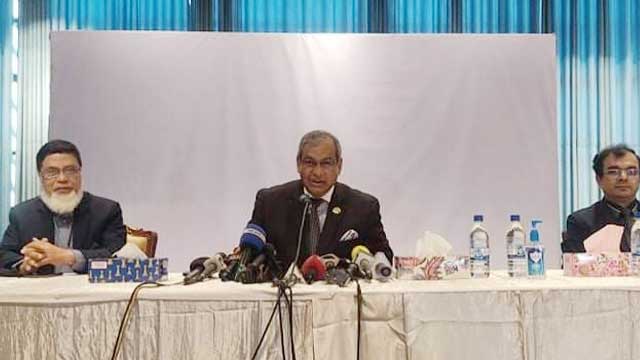The Dhaka Water Supply and Sewerage Authority managing director Taqsem A Khan said on Wednesday that they would give a proposal to the government to increase water tariffs by up to 40 per cent in order to reduce the subsidy.
‘We will give a proposal to the government to increase water tariffs by up to 40 per cent. The government asked us to match the selling price of water with the production costs to reduce the subsidy by 100 per cent gradually,’ Taqsem told New Age.
If the government continued providing subsidies, the Dhaka WASA would not require increasing the water tariffs, Taqsem earlier on Wednesday told reporters at the WASA Bhaban at Karwanbazar in the capital.
He said that they discussed separate proposals of raising water tariffs by 100, 50, 40 and 20 per cent in a board meeting on Monday.
‘Now, even if the government increases water tariffs by up to 100 per cent, we do not have any objection,’ he added.
He also said that they considered raising water tariffs to end government subsidy in the second as it was feared that multinational lenders such as the World Bank, Asian Development Bank, Japan International Cooperation Agency, the Export-Import Bank of China would not provide loans in WASA projects provided there was a big gap between production costs and selling costs.
‘Currently, we get a loan from them as government subsidy comes as a kind of guarantee,’ he said, adding that an organisation could not survive begging.
The production cost for each unit of water [1,000 litres] is Tk 25. But the WASA sells it at Tk 15.28 for domestic use and Tk 42 for commercial purposes, Taqsem said.
Taqsem added that Dhaka WASA was supplying 95 per cent water to domestic users and five per cent to commercial users.
‘It is difficult to make up for the losses from domestic users with the profits from commercial users,’ he added.
He said that people living in Dhaka are mostly privileged compared with other places across the country.
‘People living in the capital’s Gulshan, Banani and other areas paying one lakh taka as rent. Why those privileged people will enjoy the government’s subsidy,’ he questioned.
He said that the new proposal might be effective in 2022.
Transparency International Bangladesh executive director Iftekharuzzaman said that instead of raising prices to reduce the subsidy, Dhaka WASA should give attention to minimising the production cost through addressing corruption and irregularities.
‘The production cost is rising gradually due to various corruptions, irregularities and inefficiency. The authorities lacked accountability, resulting in the hike of prices every year,’ he added.
‘It is an authoritarian organisation depending on a single person’s decision. If the WASA reduces corruption and irregularities and increases efficiency, the production cost will come down to less than the current selling price,’ he added.
Consumers Association of Bangladesh president Ghulam Rahman said that the lone water supplying agency was becoming a business entity instead of a services provider.
‘As there is no competition, the authority is hiking water tariffs putting an increased burden on people’s shoulders amid the Covid situation. No projects are being implemented timely resulting in production cost hike,’ he added.
He said that they should prioritise cost-cutting to tariff hikes.
‘Many public service organisations managing directors’ post are being held by either joint secretary or additional secretary with their salary hovering over just Tk one lakh. The Dhaka WASA managing director draws Tk more than six lakh a month,’ he added.
Jahangirnagar University economics department professor Anu Muhammad said that everyone in Dhaka city knew about the corruption and irregularities of the Dhaka WASA but they did not have any choice.
‘Dhaka WASA should public the breakdown of their production cost as people have the right to know this,’ he said.
In a meeting on February 7, the Dhaka WASA board discussed a proposal of raising water tariffs from Tk 15.18 to Tk 21 for domestic users and from Tk 42 to Tk 55 for commercial and industrial users.
The board wanted to send this proposal to the Ministry of Local Government, Rural Development and Co-operatives but put the decision on hold as most of the members opposed the move.
The Dhaka WASA can increase the water tariffs yearly by five per cent in consultation with the government as per the Dhaka Water Supply and Sewerage Authority Act, 1996.
Different socio-political organisations have criticised the government’s move to increase water tariffs amid the lingering Covid situation.
On May 24, 2021, the Dhaka WASA increased water tariffs by five per cent without addressing the water crisis in different places in the city at a time when a lingering Covid pandemic affected the people’s income.
The increased water tariff came into effect on July 1, 2021.
It was the 14th time the Dhaka WASA had increased water tariffs in 13 years since the ruling Awami League came into power in 2009.
It took the tariffs for each unit of water to Tk 15.18 for residential use and Tk 42 for commercial use, up from the previous prices of Tk 14.46 and Tk 40 respectively.
In the past 13 years, the Dhaka WASA has increased the water tariffs for residential use by 181 per cent from Tk 5.75 a unit in 2009 to Tk 15.18 in 2021.





